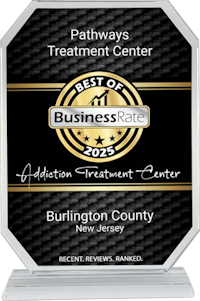What to Bring to Rehab in Burlington, New Jersey
Starting rehab is a big step towards getting better and improving yourself. At Pathways Treatment Center, knowing what to bring can make settling in much easier. Here’s a simple guide on what you need to pack, what to leave behind, and how to get ready for this new experience.
What to Bring to Rehab
What You Can Bring?
Our New Jersey drug and alcohol rehab offers outpatient treatment, meaning our clients come to our facility for treatment during the day or evening, but are able to return home after daily treatments. When packing to come to our facility for a day treatment, you will not need to bring many items with you. Outpatient treatment requires a few hours per day.
However, if you choose to join our sober living program, it’s useful to review this list of what you can bring.

- Loose-fitting shirts (t-shirts, long-sleeved shirts)
- Comfortable pants (sweatpants, yoga pants, jeans without excessive embellishments)
- Shorts (within the facility’s guidelines)
- Underwear
- Socks
- Pajamas or comfortable sleepwear
- Sweaters or hoodies
- Shoes: Comfortable walking shoes, sneakers, and possibly slippers (check if open-back slippers are allowed). Avoid shoes with heels or complicated laces.
- Toothbrush and toothpaste
- Shampoo and conditioner (travel-sized or facility-approved)
- Soap or body wash (travel-sized or facility-approved)
- Deodorant (non-aerosol)
- Shaving cream and razors (some facilities may have restrictions or require staff to hold onto them)
- Feminine hygiene products
- Hairbrush or comb
- Small mirror (some facilities provide these)
- Nail clippers and nail file (some facilities may hold onto these)
- Linens (check with the facility first, they often provide these):
- Towel
- Washcloths
- Pillow
- Blanket
- Photo Identification: Driver’s license, state ID, or passport.
- Insurance Card(s)
- List of Medications: Including dosages and prescribing doctors.
- Emergency Contact Information: Names, phone numbers, and relationships.
- Any pre-admission paperwork provided by the facility.
- Prescription Medications: In their original labeled containers. The facility will typically manage the storage and administration of these.
- Over-the-counter medications: Check with the facility about their policy on bringing these. They may prefer to provide them.
- Books: Softcover books are usually preferred.
- Magazines: Again, softcover.
- Journals and Pens: For writing and self-reflection.
- Drawing or Coloring Supplies: Adult coloring books, colored pencils, etc.
- Small Puzzles or Games: Check if allowed and if they fit within space restrictions.
- Cell Phone: Many facilities restrict or limit cell phone use to specific times or not at all.
- Laptop or Tablet: Policies vary greatly. Some may allow them for limited use, while others prohibit them entirely.
- MP3 Player (without internet access): Some facilities allow these.
- Headphones: Non-wireless headphones are often preferred.
- Chargers: If electronics are allowed, bring the necessary chargers.
- Small Amount of Cash: For vending machines or small personal needs (check the facility’s policy).
- Prepaid Phone Card: If personal cell phones are restricted.
Avoid bringing expensive jewelry or valuable items, as the facility may not be responsible for them.
- Eyeglasses or Contact Lenses and Solution
- Hearing Aids and Batteries
- Assistive Devices: Canes, walkers (confirm with the facility).
- Photographs of Loved Ones: For personal comfort.
- Stamps and Stationery: For writing letters.
- Small Religious or Spiritual Items: If they provide comfort and are within facility guidelines.

What to Bring to Rehab
What Not To Bring To Rehab?
While preparing for rehab, it’s crucial to know what items are prohibited. Bringing the wrong items can not only disrupt your experience but may also hinder the recovery process. Pathways Treatment Center has specific guidelines regarding what should not be brought into the facility.
- Alcohol and illegal drugs
- Weapons of any kind
- Aerosol cans (due to flammability)
- Mouthwash or products containing alcohol
- Scented products (due to potential allergies)
- Revealing clothing
- Excessive amounts of clothing or luggage
- Food or drinks (unless specifically approved due to dietary needs)
- Cleaning supplies
- Glass items
- Playing cards (in some facilities due to gambling concerns)
What to Bring to Rehab
Getting Ready for Rehab
Getting ready is key. Accept that it can be tough at times, but remind yourself that it’s part of getting better. Having a positive mindset can lead to personal growth.
Talk to a counselor or therapist before heading to rehab. They can give advice and tips on handling your feelings. Open up to friends or family for extra support. Setting goals for what you want to achieve in rehab can keep you focused.

Talking To Friends and Family About Rehab
Before you begin a rehab program, it will be helpful to speak with friends and family about this step of your addiction recovery. Loved ones may have noticed a struggle with drugs or alcohol and will likely support your dedication to stop abuse. Informing friends and family that you will be going to rehab is also a critical step in gaining their support. A strong support network, especially while in outpatient treatment, is key to a successful recovery. For outpatient rehab, individuals require a safe environment to return to after treatment, where no triggers or influences to use substances are present.
Talking To Your Employer About Rehab
If you’re employed at the time you choose to go to rehab, you will need to speak to your employer about allowing time off for you to complete treatment. Some rehabs offer evening treatment programs, which may enable you to go to treatment discreetly, without it interfering with work hours.
Under the Family and Medical Leave Act (FMLA), you’re protected from being let go for going to rehab. FMLA enables employees to take 3 months of unpaid leave for substance use disorder treatment. You can speak with the human resources department at your workplace to learn more about your eligibility for FMLA.

What Should You Do About Kids, Pets, or Others You Care For While in Rehab?
If you have children, pets, or others you care for, going to rehab is a step toward providing your loved ones with better care. By seeking treatment for drug or alcohol abuse, you’re able to find true healing, which will allow you to show up and become more reliable to the people you love.
A friend or other family member may be able to care for your children or pets while you go to rehab. If you do not have someone to take over your responsibilities temporarily, there are professional care services available.
A benefit of outpatient treatment is that you will be able to return home each day and take care of many of your usual responsibilities. It’s normal to need the extra support, however, while in treatment, to allow yourself to focus on healing.
Verify Your Insurance
We are in-network with major insurance providers in New Jersey, including:
- Humana
- Magellan
- Horizon
- Blue Cross Blue Shield
- Beacon Health
- Capital Blue
- United Healthcare
- Meritan Health
- Aetna
- Qualcare
Verify your insurance with us to see what is covered by your provider. Even if we are not in-network with your insurance provider, our admissions team may be able to work with your insurance to get some coverage for treatment.


How Long Will Rehab Last?
Rehab can be different for everyone, lasting from 30 to 90 days or even longer, based on what you need. The staff at Pathways Treatment Center will help decide how long you should stay. The main thing is to focus on getting better, not just the time you spend there.
By packing smartly and understanding what to expect, you’ll be better prepared for your rehab journey at Pathways Treatment Center. Remember, getting ready is just the start of your path to recovery. Continuing support after rehab is also key to staying on track and achieving your personal goals.
Contact Pathways Admissions to Begin Treatment
If you’re ready to take the next step, call Pathways Treatment Center today! Our admissions team will help you prepare for rehab and answer your questions about what to pack for rehab. Our outpatient treatment center in New Jersey is a great option for those who need intensive support to treat addiction, but cannot commit to full-time care for any reason.
Talk to our team to determine if Pathways is the right fit for you. Your journey to recovery begins here.



